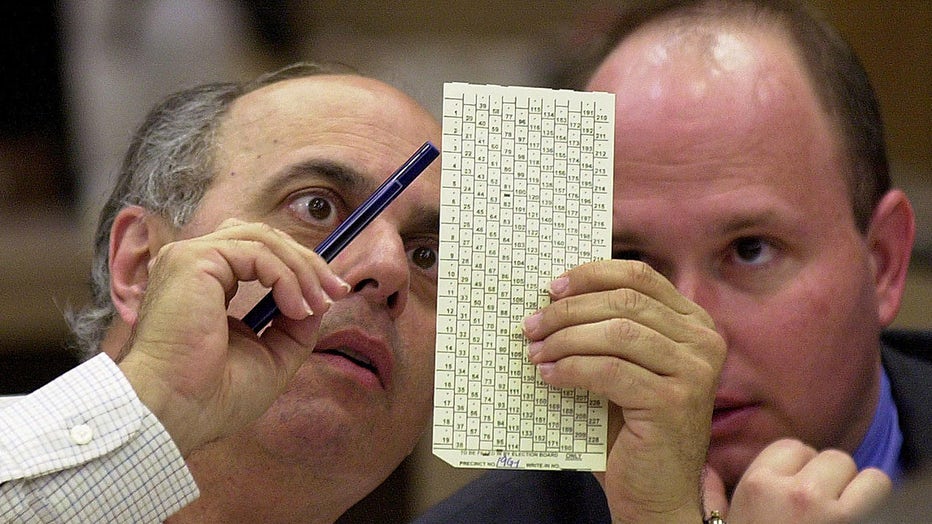The 2000 presidential election and Florida recount: ‘Truly a crazy year’
Full episode: When the networks got it wrong twice in one night
In this LiveNOW & Then full episode, we look at original TV news coverage of the back-and-forth on Election Night 2000 and beyond.
TALLAHASSEE, Fla. - Twenty-four years ago, the phrase "too close to call" reverberated through television broadcasts and newspapers across the United States.
On November 7, 2000, the presidential election hinged upon the electoral votes in Florida, determining the fate of the nation’s leadership: George W. Bush or then-Vice President Al Gore.
"2000 was a truly crazy year, and it all came down to Florida and a race that ultimately decided the race for president by 537 votes," Craig Patrick, a political editor for FOX 13 Tampa and journalist for nearly three decades, said Wednesday. "We knew the race between Bush and Gore was going to be very close. We knew that Florida could be the decider in terms of the Electoral College math."
Presidential winner prematurely declared
Initially, television networks relied on exit polls and data from selected swing precincts in Florida to prematurely declare victory for Democratic nominee Al Gore. Viewers were greeted with images of Gore as the projected president.
However, after making this declaration, networks received calls from Republicans asserting that the race in Florida was far from decided. Soon, other networks began to take note of these objections and arrived at similar conclusions.

Screenshot of CNN prematurely calling Florida for Al Gore (FOX 5 file)
As the evening progressed, it appeared increasingly favorable for Bush, leading Gore to concede. Consequently, the major broadcast networks announced Bush as the winner. Yet, as vote counts continued throughout the night, the race tightened significantly, prompting Gore to retract his concession to Bush and the networks.
In turn, the networks were forced to withdraw their earlier call for Bush as the margin between the candidates continued to shrink with each new tally.
The following day brought uncertainty regarding the presidency. In the ensuing hours, Katherine Harris, Florida’s secretary of state responsible for officially certifying the winner, declared Bush the victor in Florida.
"Because of the way that Florida tabulated and did voting at that particular time, that led to a great deal of confusion, especially in one county in particular, Palm Beach County," Patrick continued. "That led to litigation that led to the race being decided by Florida, 537 votes and ultimately a ruling in the U.S. Supreme Court."
Voters confused by "butterfly ballots"

A closer look at Palm Beach County's controversial "butterfly ballot" (FOX 5 file)
Confusion surrounded the "butterfly ballots" marked for third-party candidate Patrick Buchanan in Palm Beach County’s heavily Democratic precincts, suggesting that many voters mistakenly believed they were casting their votes for Gore.
"I probably got some votes that were intended for Al Gore. I don’t know how many, but that’s what I believe," Buchanan himself said at the time.
Additionally, the use of punch-card ballots resulted in issues where voters' attempts to register their choices only partially succeeded, leading to the infamous "hanging chads" and "dimpled chads."

Broward County canvassing board member Judge Robert Rosenberg shows a ballot to an unidentified observer on November, 23 2000 at the Broward County Courthouse in Ft. Lauderdale, Florida. (Credit: RHONA WISE/AFP via Getty Images)
As the situation escalated, attorneys from both sides began to converge on Florida, leading to an unprecedented five-week legal confrontation over the ballots, electoral rules, and judicial interpretations.
"There were a lot of, not just legal challenges, but public protests and on both sides," Patrick recalled. "Both sides were well aware of the stakes. You also had very high tensions."
Despite Gore winning the popular vote by approximately a half-million ballots, the critical Electoral College count remained so close that Florida's outcome ultimately determined the presidency, with George W. Bush emerging as the victor.
"At the end of the day, after the U.S. Supreme Court ruling, you had Vice President Gore saying that he did not agree with the decision but that he accepted it, and we ultimately moved on," Patrick remarked, noting, "We're seeing some striking contrast from 24 years ago to the way our nation has changed in the two decades since."
Voting system changes in Florida
Florida faced considerable criticism for its handling of the contentious 2000 recount, particularly due to the absence of a uniform process. This has since been rectified, as the state legislature has established clear guidelines for conducting recounts.
According to Patrick, the voting system in the Sunshine State has also evolved significantly in the years since.
"It changed the way Florida votes. That was for sure," Patrick said, adding that the state now requires all counties to use ballots where voters use a pen to mark their candidate's name, and how counts proceed is now clearly spelled out.
The ballots undergo a second review through scanning machines in each county, under the vigilant supervision of representatives from both political parties and their respective campaigns. Any ballots that remain unreadable for the races being recounted are set aside.
"We certainly had some controversies in 2018, where we had some recounts and some very close races in terms of how ballots are designed and what counts and what doesn't, but the process was far less confusing, at the very least, than what we had in 2000," Patrick added.
2000 election vs. 2024 election
How are votes counted in U.S. elections?
Unlike many countries, U.S. elections are highly decentralized and include long lists of races. Elections for president and Congress all the way down to local offices are run by county, town and state election officials, not by any national election officials. Charles Stewart III, Kenan Sahin Distinguished Professor of Political Science at MIT, joined LiveNOW from FOX to break it all down.
With the American electorate so evenly divided, there may be precincts in the upcoming presidential election close enough that officials will have to recount the votes. But experts say not to expect those recounts to change the winner. They rarely do, even when the margins are tiny.
"The (original) count is pretty accurate because the machines work — they work very well," said Tammy Patrick, a former election official in Arizona who is now with the National Association of Election Officials. "We have recounts and we have audits to make sure we got it right."
There have been 36 recounts in statewide general elections since America’s most famous recount in 2000.
"Well, we're looking at a very, very close race," Patrick said of the upcoming 2024 election. "Florida is no longer a swing state by all measures. So you have now 43 states, including Florida, that don't appear to be on the board. So the focus is going to be certainly on what used to be called or is called the blue wall states of Wisconsin, Michigan and Pennsylvania. Those will be the big three to watch for sure. And then you have the Sunbelt states as well in Arizona, Nevada, Georgia and North Carolina. All eyes will surely be on those seven states."
RELATED: Here’s when we’ll know the election results in key swing states

